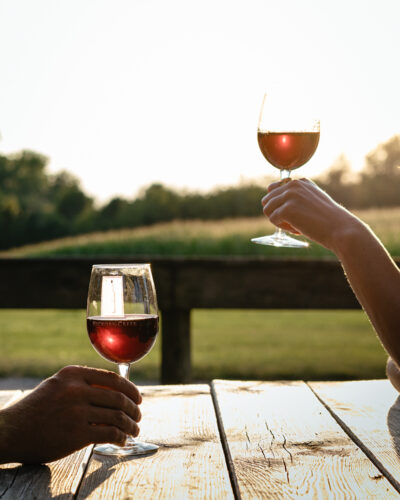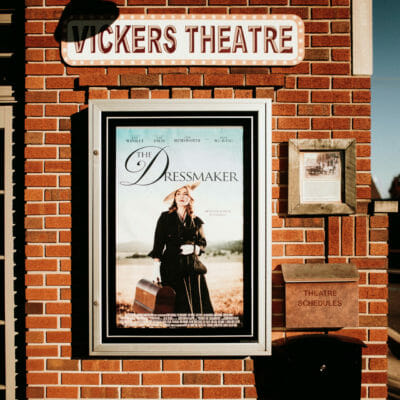AN INTERVIEW WITH THE OWNER AND WINEMAKER OF HICKORY CREEK WINERY
Interview by Mandy Lancia
Images by Jodi Bodtke
September 2021
Adam McBride’s dream to become a winemaker began in the Air Force. Stationed in a small village in Germany’s Mosel Valley, his appreciation for traditional European wines changed the trajectory of his career. Now the owner of Hickory Creek Winery, Adam handcrafts small-batch wines on a 40-acre Lake Michigan Shore vineyard.
Adam, tell us a bit about your background.
I’m a West Michigan native from a small town in Allegan County. I went to Michigan State for college and then immediately into the Air Force after graduating. I was a logistics officer for eight years before returning to Michigan to start a civilian career in logistics and supply chain management.
When did your love of wine begin? And at what point did farming and winemaking become the thing you had to do?
I became interested in wine while living in Europe. I was stationed in Germany and lived in a small winemaking village in the Mosel Valley. My backyard was a Riesling vineyard. I spent a lot of time visiting wineries and vineyards, going to winemaker dinners, and participating in Riesling festivals. That is where the seed was planted, and I guess I never really shook it. Wanting to own a vineyard and winery became a back-burner dream.
After moving back to Michigan, I transitioned to a career in corporate supply chain, transportation, and warehousing for large manufacturing companies. Still, I never really let go of my dream. In 2012, I was in an executive leadership program where my coach challenged me to explore big, seemingly far-fetched goals and aspirations. I had to focus on the most important ones and position myself to achieve them. So I did. That seminar was pivotal for me and became the foundation for pursuing this passion.
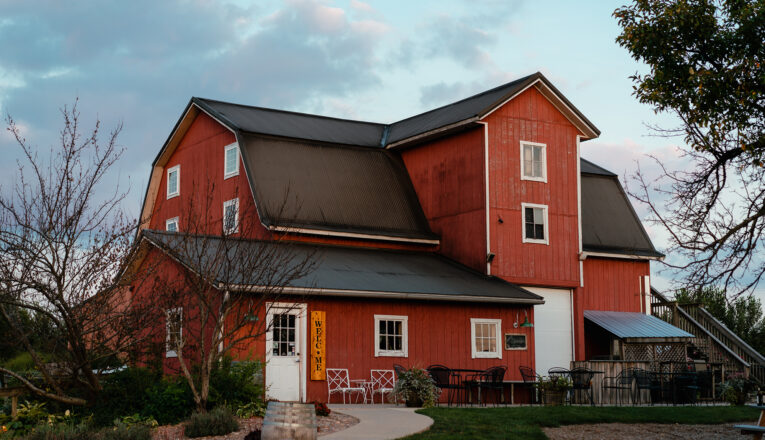
The transition from military and manufacturing to farming and winemaking seems huge. Was it? Or were there skills that naturally carried through?
There are parts of this new career that fit right in with my operations and military background, like leadership, critical thinking, process improvement, and warehouse and inventory management. The steepest learning curve for me was agriculture and chemistry. I don’t have a farming background and hadn’t dealt with pH levels or chemistry since high school. I did have some wine knowledge from my Napa (WSET Level 3 Advanced) training, but it was more high-level and involved knowledge of regions, grapes, and systematic tasting. To bridge the knowledge gap in my first few months, I took a couple of Wine and Viticulture courses at Lake Michigan College.
From my very first class, I was amazed at the level of depth in the curriculum, the world-class faculty, and the incredible facilities — both the state-of-the-art teaching winery and the research vineyard outside of Benton Harbor. There were many days that I’d learn something in class in the morning that I would use in a real-world situation at the winery that afternoon. I can’t say enough about the program and the team running it. I went through the full degree program and graduated with my Associate’s Degree in Wine and Viticulture Technology in December 2020. I’d say the LMC program was one of the most important things I’ve done in my journey to becoming a professional winemaker.
Can you walk us through the kindergarten edition of small-batch wine production?
Of course. For white wine, we start with converting grapes into juice by crushing, destemming, and pressing. Then we add yeast to kick off the fermentation, converting the natural sugars in the fruit into alcohol, with carbon dioxide as a by-product. Once fermentation is complete, we age the wine. Then it is filtered and bottled.
For red wine, we crush and destem the grapes, then ferment with the skins to extract color, tannins, and flavor. After fermenting the sugars to alcohol, we press the wine to remove the skins and seeds. Once complete, we introduce a beneficial bacteria to convert malic acid to lactic acid. When this process is complete, we store the wine in barrels anywhere from 6 to 24 months before bottling.
There are always exceptions to these processes, like stainless steel aged red wine or barrel-fermented white wine. Rosé and orange wine are variants of these processes as well.
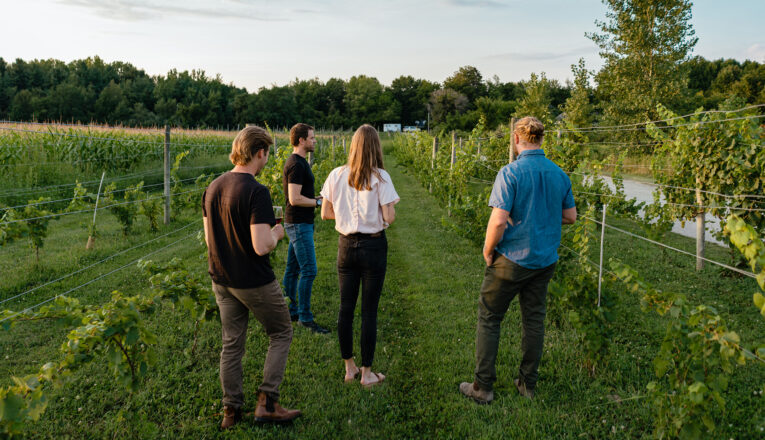
Tell us about Hickory Creek wines. What makes them unique among Lake Michigan Shore wines?
My time in Europe is one of the biggest influences on my winemaking approach. We don’t make syrupy Rieslings or fruit wines that Michigan has a reputation for making. Our wines tend to be dry. I prefer to use traditional old-world cultivars, although I’ve been impressed with some new hybrid varieties coming out of the region like Marquette. Stylistically, we try to showcase the region and are not trying to be something we’re not. If you are looking for a Napa Cab, a big buttery California Chardonnay, or a sugary Moscato, you won’t find it here.
Our cool-climate wines have bright acidity, earthy flavors, spice, and herbal notes. We don’t distract ourselves from winemaking by dabbling in cider, beer, or spirits. Right now, from a core competency standpoint, this is a winery that makes wine. We are laser-focused on getting really good at just that.
How would you describe Hickory Creek’s tasting room? What do you want guests to experience there?
We’re in the middle of nearly 40 acres of rolling farmland and vineyard. The winery is housed in a red barn patterned after a horse livery a few miles from here. We also use our barrel room to host tastings and have outdoor seating options on our patio and picnic area.
I want visitors at Hickory Creek to feel relaxed and welcome. I want our wines, all wines actually, to be approachable for everyone. I want our guests to learn something and have a fun, memorable experience where they sense our passion for wine and people. We had a google review last summer that said, ‘It felt like we were over at a friend’s house.’ I would be happy if everyone who left Hickory Creek felt that way.
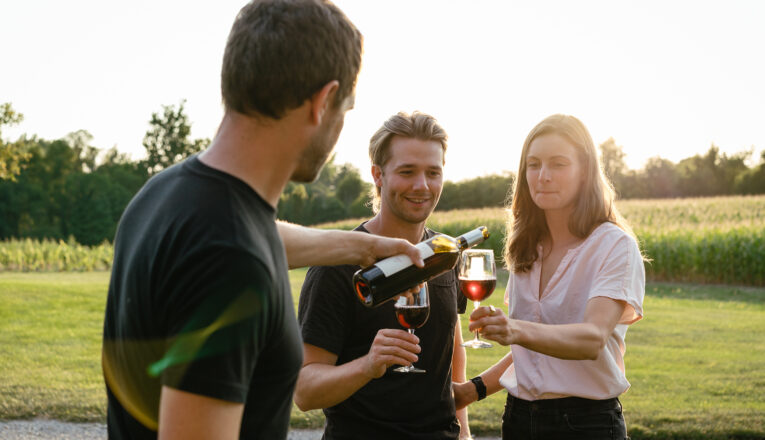
Any local tips you’d like to share? Favorite places to go or things to do?
This corner of Michigan is special. It feels like a million miles from anywhere but so close to everything. We have quaint villages dotting the countryside and picturesque beach towns up and down Lake Michigan’s coast.
Peasant’s Pantry is my go-to for espresso and arguably the best baked goods in the region. Greenbush Brewing Company is a favorite spot to grab lunch and local craft beer. It’s hard to beat Terrace Room for a great meal and impressive wine list. And I’ll always have a special place in my heart for Bentwood Tavern as they were the first local restaurant to put one of my wines on their list. I always celebrate my birthday there with friends and dig into some of the area’s best seafood dishes.
When I can break away from the winery, I like to hop on my Harley-Davidson Softtail Slim and take in the winding roads of Michigan wine country, usually ending up at Lake Michigan.
Hickory Creek Winery
750 Browntown Road
Buchanan, MI 49107
@hickorycreekwinery
